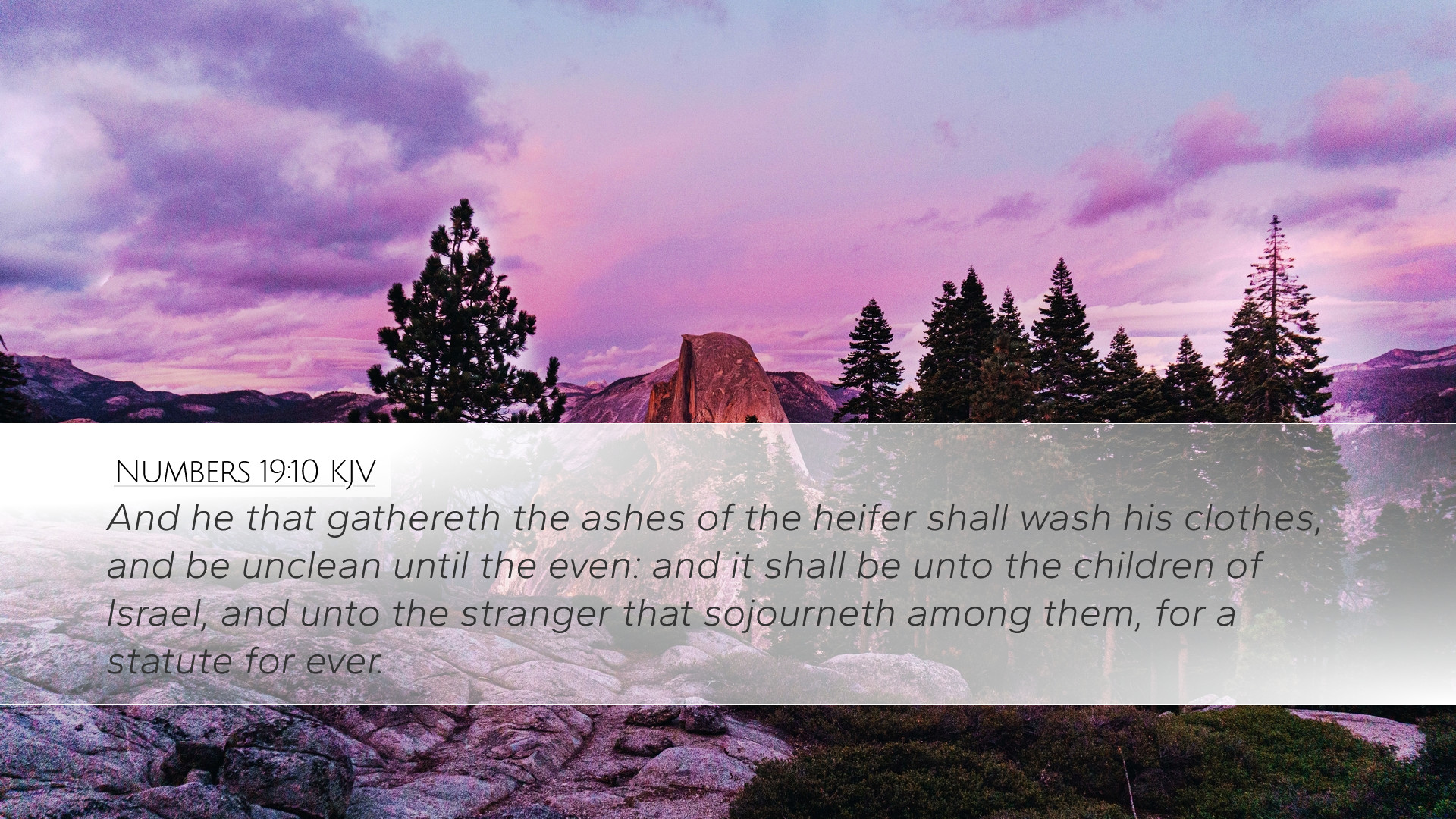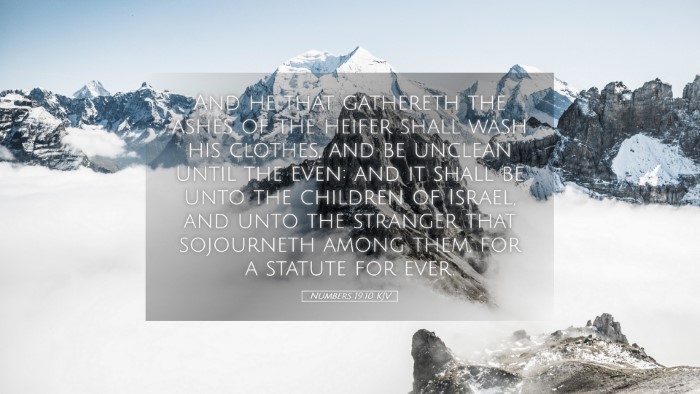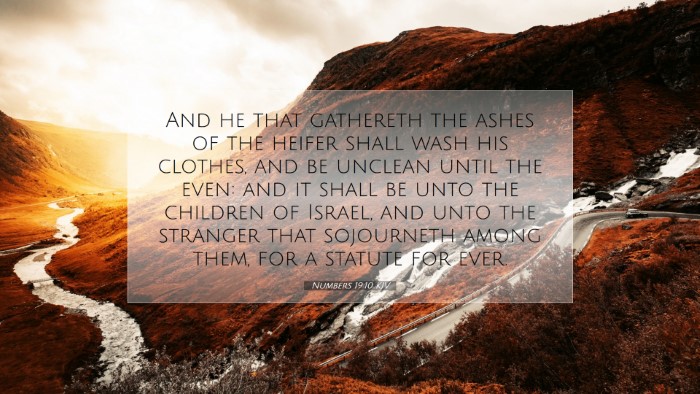Commentary on Numbers 19:10
Verse: Numbers 19:10 - "And he that gathereth the ashes of the heifer shall wash his clothes, and be unclean until the even: and it shall be unto the children of Israel, and unto the stranger that sojourneth among them, for a statute for ever."
Introduction
This verse forms a crucial part of the legislation regarding the red heifer, which plays a significant role in purifying individuals from defilements particularly related to death. The importance of this ritual underscores the themes of holiness, purity, and the covenant community in Israel's life. The insights provided by noted biblical commentators such as Matthew Henry, Albert Barnes, and Adam Clarke help elucidate the deeper meanings and applications of this statute.
Context and Historical Background
Numerous scholars highlight the thematic significance of cleansing in the book of Numbers. It pointed towards the need for the Israelites to maintain a distinct identity as God’s holy people, especially amidst the challenges they faced in the wilderness. The necessity of rites and rituals, such as the one involving the ashes of the heifer, reveals aspects of their covenant relationship with the Lord.
Matthew Henry’s Perspective
Matthew Henry emphasizes the seriousness with which God views ceremonial purity. He notes that this statute regarding the ashes of the red heifer serves both a practical and a spiritual purpose. The ashes symbolize the removal of sin and defilement, particularly in contexts concerning death, which was seen as a powerful impurity.
Key Points from Henry:
- Physical and Spiritual Cleansing: The act of gathering ashes signifies preparation for purification, reflecting the broader biblical theme of redemption.
- Consequences of Defilement: Those involved in the ashes' preparation must observe purity, highlighting the interconnectedness of community members before God.
- Implications for Strangers: The principle of inclusion in these statutes speaks to the universal applicability of God's holiness principles.
Albert Barnes’ Insights
Albert Barnes provides a comprehensive look at the ceremonial laws outlined in Numbers, indicating that the ashes represent the means through which the Israelites, and the sojourning Gentiles, can regain their purity. This inclusion points to God's grace towards those outside the covenant community.
Highlights from Barnes:
- Cleansing Process: Barnes notes that washing clothes and being unclean until evening is a reminder of the need for continual cleansing and renewal in the believer’s life.
- Perpetual Statute: The mention of this statute being 'for a statute forever' reinforces the idea of maintaining holiness across generations, which reflects the timeless nature of God's commands.
- Spiritual Symbolism: The heifer's ashes are interpreted as a foreshadowing of Christ's ultimate sacrifice, wherein believers are cleansed from sin permanently.
Adam Clarke’s Commentary
Adam Clarke offers a thorough exploration of each element in Numbers 19:10. He approaches the text with an analytical eye, addressing the practical implications of these rituals and their intended impact on the community.
Insights from Clarke:
- The Nature of Labor: Clarke remarks on the significance of the labor in gathering ashes, suggesting that ministry and service towards holiness require effort and diligence.
- Community Ethics: The regulation that includes both native Israelites and strangers highlights the ethical considerations God requires of His people, urging them to practice inclusivity.
- Symbol of Death and Life: He draws a connection between death's defilement and the purification process, reinforcing that only through proper rituals can life (spiritual renewal) be restored.
Theological Implications
This verse and its accompanying commentary invite deep reflection on various theological themes, notably the nature of holiness, the need for purification from sin, and the inclusivity of God's covenant. As pastors, theologians, and students of the Bible engage with this text, several implications emerge:
1. Holiness as a Requirement
The call to be unclean until evening signifies a period of transformation. This period relates to the lived experience of believers working through their sanctification process, emphasizing holiness as both a divine command and a human journey.
2. The Ministry of Service
Gathering the ashes symbolizes the service required in the ministry of reconciliation. Every believer is called to be an active participant in God’s redemptive work—pointing to the mission of sharing the gospel and leading lives that reflect Christ.
3. Inclusion in God’s Plan
This passage prophetically reflects the heart of God toward all nations, foreshadowing the New Covenant's establishment in Christ. It challenges the church to remain inclusive, building a community that embodies grace and mercy to all.
Practical Applications
As one contemplates the directives in Numbers 19:10, several practical applications arise for personal and communal reflection:
1. Emphasis on Rituals vs. Reality
Believers are encouraged to recognize the balance between the observance of religious rituals and the genuine pursuit of a holy life. Commitment to both is vital for a vibrant faith community.
2. Regular Reflection on Purity
Regular self-examination can promote a life lived in accordance with God’s command, helping believers remain attuned to their spiritual condition while combating the spiritual pollution of the contemporary world.
3. Educating on Inclusivity
Churches can benefit from teachings that stress inclusivity and the embracing of strangers within their communities, mirroring how God's laws were meant to encompass all who desire to participate in His covenant.
Conclusion
In summary, Numbers 19:10 serves not just as a piece of legislation but as a profound theological statement about the nature of God’s holiness, the seriousness of sin, and the inclusivity of the community He intends to build. Drawing from the cumulative wisdom of Matthew Henry, Albert Barnes, and Adam Clarke provides rich insights that are invaluable for pastors, scholars, and all who seek to understand God’s will as revealed in Scripture.


